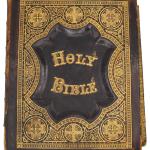As part of its LGBTQ Pride observances, Western University in Ontario put out a poster that included a picture of two young women in hijabs kissing. an effort to be inclusive of Muslims. But Muslims didn’t want to be included.
A nation-wide uproar ensued, with Muslims demanding that the image be removed. Because Muslims are considered to be oppressed, by the canons of intersectionality, the “woke” university did remove the image.
Now it would be easy to be indignant about the Muslims’ reaction, attacking the lack of freedom in Islam, criticizing the way homosexuals are mistreated in many Muslim countries, and ridiculing the claim that “there are no queer Muslims.” But I came across a thoughtful response to the controversy by a Muslim woman, “Sr. Iman,” in the Islamic online magazine Traversing Tradition entitled LGBT Propaganda Under the Microscope.
She disputes the notion that sexuality constitutes an “identity.”
Muslims do not identify with our desires, let alone any other adjective we would use to describe ourselves. We are a community of people based off of a permanent ideological relationship with one another. Allah ﷻ has given us a beautiful name, Muslim, and it is not within the rights of someone who considers themselves Muslim to subsequently change that identity.
She does not deny that some Muslims might have sexual desires for someone of the same sex. But “Muslims with homosexual desires are Muslim, exclusively.” Similarly, “It would be rather strange for any Muslim to call themselves a heterosexual Muslim or an alcoholic Muslim.” She continues, “according to Islam, desires of any kind are simply just desires.” Allah gives different people different inclinations as tests, to be assessed at the Day of Judgment.
The reason why “there are no queer Muslims” is that the very category of “queer” involves an ideology that is contrary to Islam. And no Muslim can agree to that ideology:
Queer Muslims do not exist. According to the Merriam-Webster dictionary, queer as a transitive verb is defined by the following; “to consider or interpret (something) from a perspective that rejects traditional categories of gender and sexuality: to apply ideas from queer theory to (something)”[2]. Queer theory is “an approach to literary and cultural study that rejects traditional categories of gender and sexuality”[3]. From a social perspective, ‘queer’ has been used to describe those who have abnormal sexual or romantic attractions, while also being ‘used as an umbrella term that people could classify themselves with, under their own discretion’. . . .
The term ‘queer’ is much more than a notion of sexuality, romantic attraction, or identity. It reflects a movement that actively challenges the social norms of society, to legitimize sexuality outside the bounds of marriage between a man and a woman as moral or valid. Any Muslim who affirms this has done something beyond the folds of Islam. . . .It is an oxymoron to self-identify as a Queer Muslim, because one cannot identify with two conflicting ideologies and movements. The individuals that are caught in the crossfire of these two polar opposite movements will need to choose between identifying as a Queer person or as a Muslim, otherwise they will be viewed as a fasiq (openly corrupt individual) by the Muslim community.
Furthermore, she writes, in words that would cut the woke community to the quick, the contemporary effort to impose queer ideology and a different sexual ethic on Muslims is racist and colonialist:
Additionally, the pressure by the West onto the Ummah to accept LGBT morals and values is inherently racist and projects a European superiority complex. Despite movements to decolonize, there still remains in the West a perceived moral duty to civilize the rest of the world. The ongoing crusade by the West has succeeded in tainting every religious group, except Muslims. . . .
The poster that had circulated is a manifestation of the arrogance, racism and entitlement of Western society.
Good points? Do they apply also in a Christian context? Is there anything here that would not cross over? Clearly, the discussion here is all about Law without Gospel–the great chasm between the two religions–but Christians too believe in the Law.
Might it actually be helpful to those with same-sex attractions to think in terms of their “desires” rather than their “identity”?
Doesn’t Sr. Iman make a valid point when she says that the current postmodern crusade has tainted every religion–including Christianity–except Islam? Certainly many church bodies have fully bought into the LGBT agenda. But those have also abandoned other tenets of historic Christianity, so the comparison is not completely valid. It certainly doesn’t demonstrate the superiority of Islam, which has other moral problems, such as the current vogue among some of its adherents for terrorism and violent jihad. And a Christian approach to homosexuality must include the Gospel of forgiveness in Christ, and not the death penalty, as carried out by some Muslim countries.
Still, Sr. Iman has given a thoughtful and forceful rebuttal to what she describes as “LGBT propaganda,” one that is largely immune from woke activists.
Would it be possible for conservative Christians to ally with Muslims, not in religion, but in moral debates in the public square?
Image by mohamed Hassan from Pixabay














